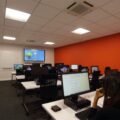average investment > Empowering Women through Education: The Role of NGOs
Empowering Women through Education: The Role of NGOs
Renowned actress Angelina Jolie once remarked, “There is no greater pillar of stability than a strong, free, and educated woman.” These profound words underscore the transformative power of education in empowering women. Education serves as a catalyst for change, breaking down societal barriers and equipping women to overcome restrictions imposed by societal norms.
In today’s global landscape, the empowerment of women is a focal point, with a strong emphasis on gender equality and the development of resilient societies. At the heart of women’s empowerment lies education, providing women with the confidence, skills, and knowledge to challenge societal norms and pursue their aspirations.
This blog delves into the pivotal role of education in women’s empowerment, examining how it opens doors of opportunity, enables women to assert their rights, and empowers young women to shape a brighter future for themselves and their communities.
Access to Education: A Key to Women’s Empowerment
Education is a fundamental right for women, endowing them with the knowledge and skills necessary to participate fully in society. It enhances economic opportunities, enables informed decision-making, and serves as a potent tool against gender inequality by challenging traditional roles. Despite this, numerous women worldwide encounter significant barriers to education, including poverty, discrimination, and cultural norms. Governments and international organizations must collaboratively address these challenges to ensure equal access to education for all women.
Studies show that completing 12 years of education can reduce child marriage by 64%, preventing health complications associated with early pregnancy and childbirth. Moreover, educating women contributes to a country’s economic growth and reduces the risk of social unrest and extremism.
Breaking Barriers: Challenges Hindering Women’s Education
Several barriers impede girls and women from completing their education, hindering women’s empowerment. These barriers include the cost of education, transportation challenges, conflicts, socio-cultural norms, early marriage, financial constraints, safety concerns, lack of infrastructure, disparities in education quality, and gender bias. Understanding and addressing these challenges is essential to ensure equal educational opportunities for women.
The Empowering Impact of Women’s Education
Breaking the Chains of Inequality: Access to education acts as a powerful tool to dismantle the chains of gender inequality. It equips women to challenge discriminatory biases, exceed societal expectations, pursue their aspirations, and contribute meaningfully to society.
Economic Empowerment: Education is a cornerstone of economic empowerment for women. It enhances employability, broadens job prospects, and enables women to secure higher-paying positions. Financial independence, achieved through education, positively impacts women’s lives and fosters economic growth in families and communities.
Decision-making Power: Education provides critical thinking skills and knowledge, empowering women to make informed decisions about their well-being. Educated women are more likely to participate in household decisions, advocate for their rights, and influence gender-equality policies.
Health and Well-being: Women’s education significantly impacts their well-being. Educated women experience improved reproductive health outcomes, possess knowledge about safe childbirth practices, contraception, hygiene, nutrition, and overall health practices. Education empowers women to control their health and break free from gender-related health restrictions.
Political Participation: Education plays a pivotal role in fostering women’s social and political participation. It enhances civic engagement, communication skills, critical thinking, and leadership qualities, enabling women to actively participate in decision-making processes, advocacy groups, and community organizations.
Empowering Future Generations: Education creates a ripple effect on future generations. Empowered, educated women become role models within their communities and families, passing on aspirations, values, and knowledge to shape a future generation that embraces equal opportunities for all.
Conclusion
Empowering women through education is essential for building a just and equitable society. Despite challenges, non-governmental organizations (NGOs) play a crucial role in this endeavor. Organizations like the United Way of Hyderabad focus on providing quality education to women from disadvantaged backgrounds, breaking the cycle of poverty and inequality.
United Way of Hyderabad’s initiatives, including scholarships, vocational training, and support for women entrepreneurs, contribute significantly to women’s empowerment. By investing in education and skills development, they empower women to take charge of their futures, become financially independent, and make positive contributions to their communities.
Supporting NGOs like the United Way of Hyderabad in their efforts to empower women through education can make a substantial difference. Breaking down barriers and creating a world where every woman has equal access to opportunities and resources is a collective goal that requires continued support and commitment.




